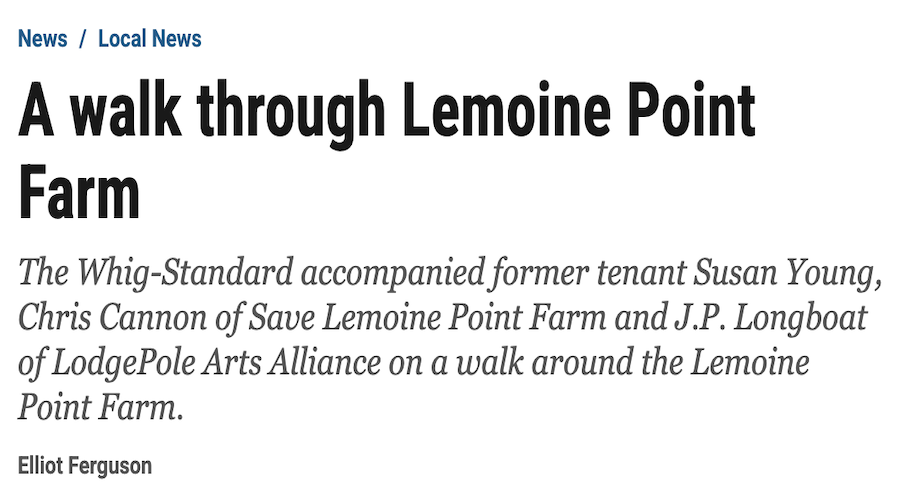A walk through Lemoine Point Farm
The Whig-Standard accompanied former tenant Susan Young, Chris Cannon of Save Lemoine Point Farm and J.P. Longboat of LodgePole Arts Alliance on a walk around the Lemoine Point Farm.
KINGSTON — Supporters of the Lemoine Point Farm at the west end of Front Road continue to push to have the property remain a green space and available to the public.
The property’s last owner, Mary Coverdale Winnett Fraser, died in April 2022 and since then the future has been uncertain for the property next to Lemoine Point Conservation area and the Norman Rogers Airport.
Her will offered the city the first right of purchase with the condition that it remain a farm with other rural and cultural uses.
Appraisals of the property ranged from $10 million and $30 million and the executors of the will have asked the courts to determine the methodology that is to be used to set the property’s value.
On Friday, at the invite of a current tenant, The Whig-Standard accompanied former tenant Susan Young, Chris Cannon of Save Lemoine Point Farm and J.P. Longboat of LodgePole Arts Alliance on a walk around the property.
In the more than 300 years since the farm was established, only a handful of people have owned it, the Coverdale family being the last.
“Our group gathered together right after we found out that Mary died and there was seven of us that live in the area and are really keen to have this stay protected land and especially not be subdivided into estate homes,” Cannon said.
“It’s a fabulous piece of property and once you do anything to start subdividing it or developing it, you’ve lost it forever.”The 33-hectare property includes about 20 hectares of pasture, about a kilometre of shoreline, wooded areas, two limestone houses and additional residential buildings, a barn, a water tower and a handful of smaller farm buildings.
Earlier this year, Longboat’s group LodgePole Arts Alliance came forward with a proposal for an Indigenous arts and culture centre as one use for the farm property.
Prior to the arrival of Europeans, Indigenous people, including Huron/Wendat, Haudenosaunee and Anishinaabe lived on the land and the farm property was a natural location for a village, Longboat said.
“What you have here is actually an ancestral area of importance because the north shore of Lake Ontario was the superhighway,” he said. “There was village activity for thousands of years here.”
Longboat said the group’s plan is in line with many of the city’s reconciliation and environmental goals.
“This would be a project that’s about sustainability,” Longboat said. “This would be a jewel in the city’s tourism because it would offer programming but also a really unique facility to gather to be in the region.”
LodgePole was featured in The Whig-Standard in this piece by Elliot Ferguson. You can read the piece and see the accompanying photographs here: https://www.thewhig.com/news/a-walk-through-lemoine-point-farm.

